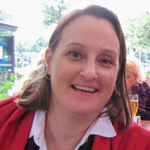Project MUSE Sales Coordinator, International and Special Markets
 First, tell us a bit about yourself (hometown, current locale, family, hobbies, community involvement?).
First, tell us a bit about yourself (hometown, current locale, family, hobbies, community involvement?).
I grew up in a farming community just outside of Decatur, Illinois. I spent my senior year of high school in Lyon, France through the Youth for Understanding exchange program. I did my undergraduate degree and two masters degrees at Indiana University in Bloomington, IN. I spent my junior year of college studying in Seville, Spain and then between masters programs I worked in Spain for two years. My first master’s degree was in West European Studies and my second one was in Library and Information Science. After graduate school I moved to New York City to work as Librarian for West European Social Science at New York University. It was great to be able to combine my two passions in one job right out of school and I stayed at NYU in that position for thirteen years.
Describe some of your responsibilities, and how you or your organization fit into the scholarly communications web.
Project MUSE is a secondary publisher. We publish humanities and social science journals online for over 120 not-for-profit publishers. We carefully select the journals that we publish in order to create cohesive interdisciplinary collections. Project MUSE is part of the Johns Hopkins University Press so we have all the benefits and challenges that come with being part of a university. My job is to sell Project MUSE to libraries of all types outside of North America and I also handle library sales to school, public, and special libraries within North America. The goals of Project MUSE align with the goals of the JHUP in that we want to be leaders and innovators in scholarly publishing. I think Project MUSE fills a special niche for smaller humanities and social science publishers because the economics of getting those journals online is quite different from putting STM journals online. In my work I can leverage the MUSE collections and the MUSE brand to benefit all of our publishers at the same time. I can get their content into countries and consortia that their own sales and marketing departments might not be able to reach. My success in selling MUSE has been thanks in large part to the high quality journals created by our participating publishers.
What career path led to your current position?
The work that I do to sell Project MUSE depends primarily on my knowledge of how libraries and librarians work. I think my background in area studies serves me well because the study of language, culture, politics, and human nature plays a part in the way I interact with librarians and sales agents. I think it also helps that I am a good researcher. While I often don’t speak the language my customer speaks, having studied several languages in school has taught me to find other ways to communicate, whether through body language, drawing pictures, or passing a calculator back and forth. I am a great example of how a liberal arts education prepares people for work in the global economy.
Where do you see scholarly communications heading, and what new directions interest you most?
I think publishing and librarianship are moving closer together. Both are shaped more and more by developments in technology. And both realms are seeking common standards for transmitting content. I think the content creators are becoming more aware of how their work will be disseminated, so much so that they will mold the content in order to reach the broadest audience. I’m not sure this latter aspect is entirely good over the long term, but it is a current reality.
What are some of the surprises/obstacles that you’ve encountered during your career?
I continue to be surprised by the similarities between the people who work in publishing and the people who work in libraries. These two communities share many of the same passions and concerns, and they are facing many of the same opportunities and threats in this economy. But too often the two sides don’t see their commonalities and a strong Us vs. Them mindset clouds the potential for collaboration. In my work with libraries outside the US I frequently encounter the belief that a liberal arts curriculum is an indulgence that developing and transitional economies can’t afford. It makes me feel sad and dismayed when a country with a rich cultural heritage focuses its educational efforts on science and technology programs. Aptitudes vary so much from one student to another y and I would like to see all students receive the broadest possible offering at their university so that each student has a better chance of finding a vocation that suits their abilities.
What advice would you give to people interested in a career in scholarly communications? What new roles or opportunities do you see emerging in the field?
This is a difficult question because I am totally split between an optimistic view of where this field is going and a negative view. On the positive side I see a strong interest on the part of all the players in creating more avenues for scholars and learners to exchange and foment ideas. On the negative side I see commercial interests monetizing every aspect of scholarly communications and I worry that this will either squeeze the life out of the academic realm or put the dialogue out of reach for all but the richest participants.
Profiled November 2010

